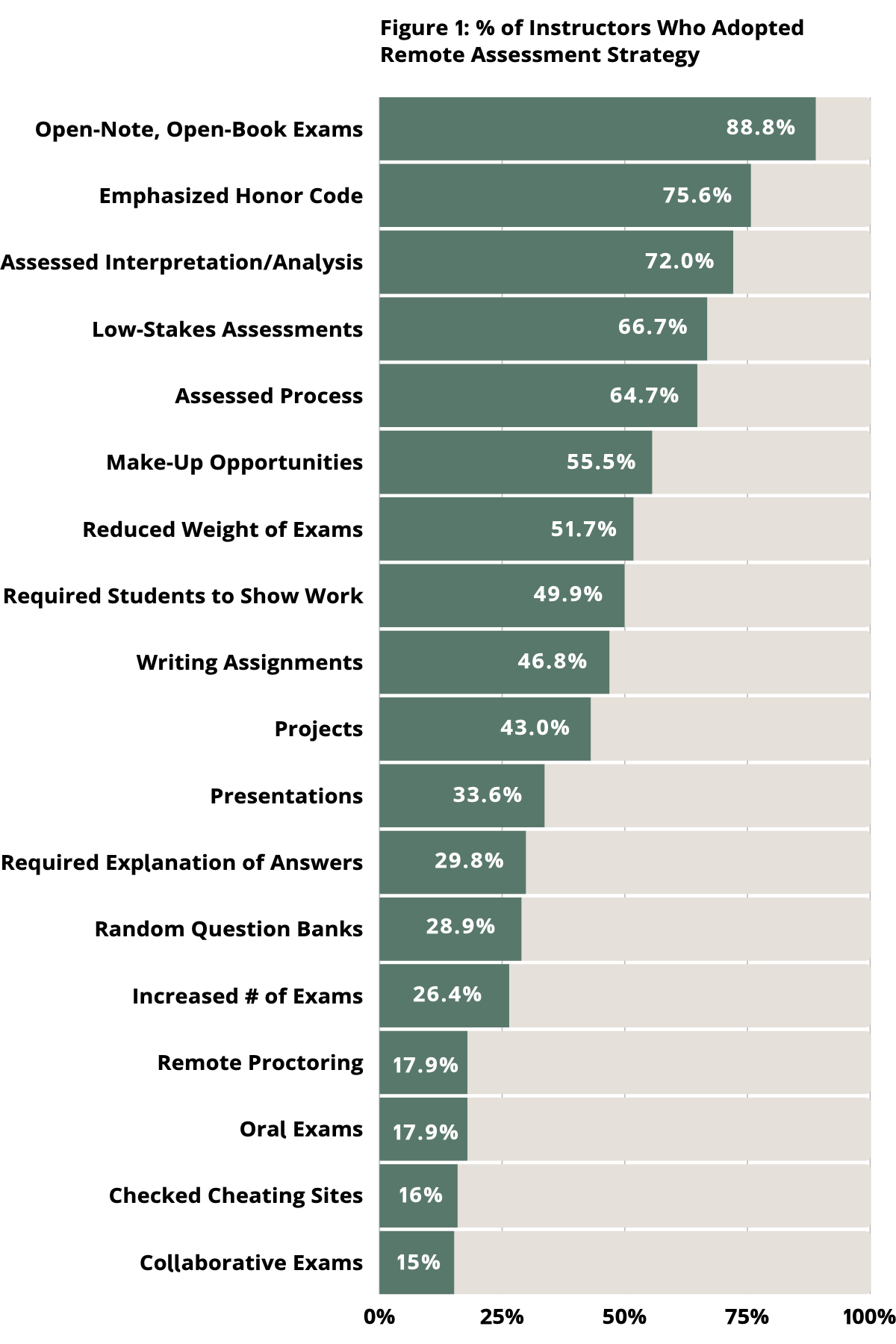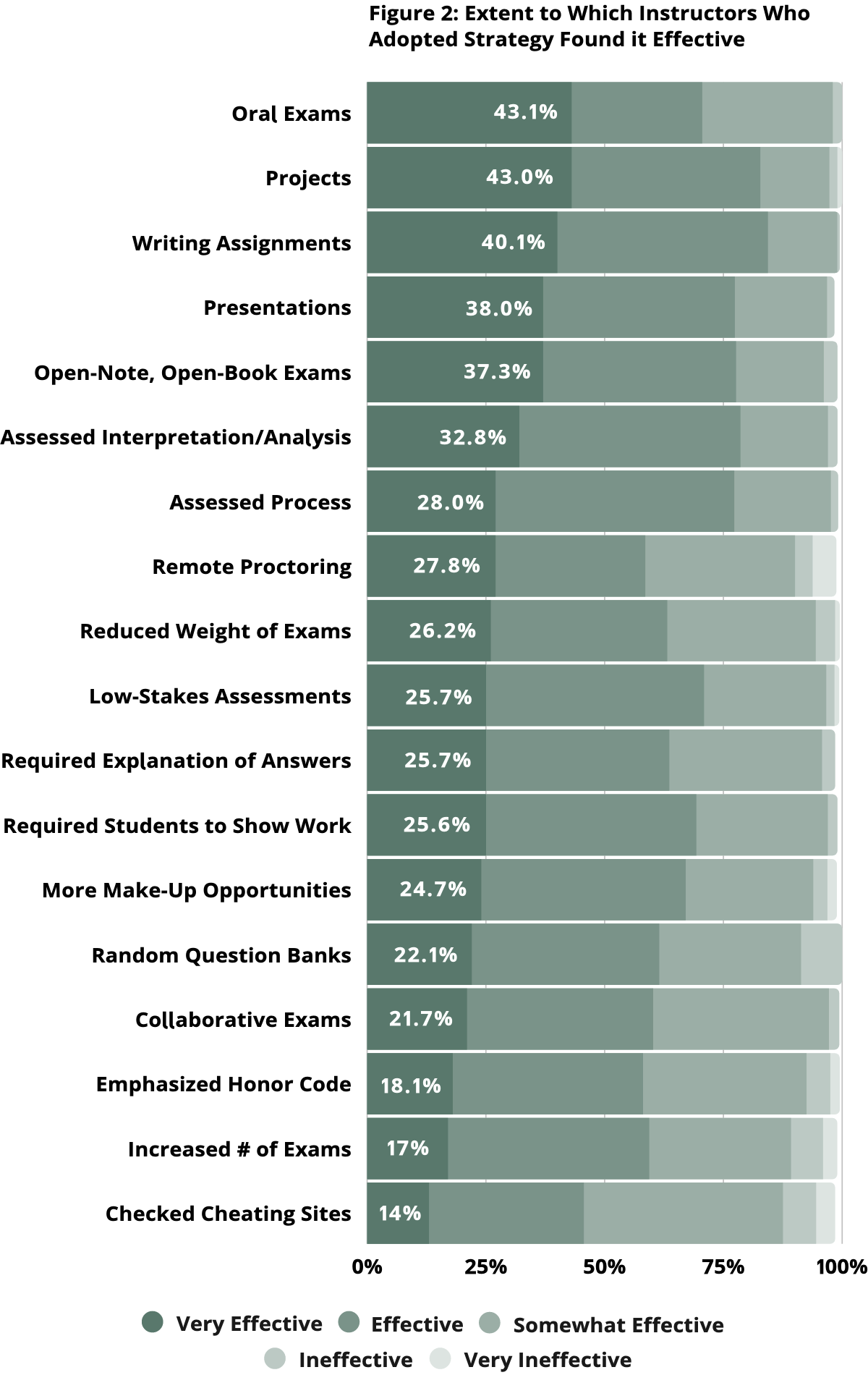Online and Blended Assessment Strategies
In the Center for the Advancement of Teaching Fall 2020 surveys, we asked Reynolda Campus faculty about the strategies they adopted to assess student learning and whether they perceived those strategies to be effective. We focused on aspects of course design, exam design, and implementation strategies that assess student learning while also promoting academic integrity. In addition, we asked faculty to share any successes or challenges associated with assessing student learning that they experienced. 22% of all faculty respondents provided additional insights to this optional, open-ended question. The findings from the survey reveal the extent to which faculty struggled with incidents of academic dishonesty as well as an increased workload associated with assessment strategies.
- “Assessment is a nightmare…”
- “I don’t think I can survive another semester with that much intensive grading and feedback.”
But the findings from the survey also offer hope and encouragement, with stories of success and concrete solutions that made assessment effective, manageable, and a positive experience for everyone.
- “A combination of open book exams within a limited time frame, together with short research projects worked really well.”
- “I replaced traditional exams with Formative Writing Exercises. Students could revise after grading. I wish I had done this years ago.”
Strategies Adopted and Their Perceived Effectiveness
In the survey, we asked faculty about their adoption of 18 different assessment strategies for fully online and blended learning contexts (Figure 1). Open-note, open-book exams was the strategy most widely adopted (89%) by Wake Forest faculty. Over two-thirds of respondents also reported emphasizing the Honor Code; assessing higher-order thinking by emphasizing interpretation and analysis; and utilizing low-stakes assessments. Of the strategies adopted, those reported to be very effective by approximately one-third or more of all respondents were oral exams; projects; writing assignments; presentations; open-note, open-book exams; and assessing interpretation and analysis (Figure 2).


There are some interesting insights when comparing strategy adoption rates with rankings of perceived effectiveness. Only two strategies overlap as both highly adopted and deemed very effective — open-note, open-book exams and assessing interpretation and analysis. The other strategies found to be very effective — oral exams, writing assignments, projects, and presentations, were adopted by less than 50% of respondents. In particular, oral exams, which were rated very effective by 43% of adopters, were only adopted by 18% of respondents. 76% of faculty emphasized the Honor Code as an assessment strategy to promote academic integrity. However, only 18% reported this as a very effective strategy. This quantitative finding is well-illustrated by one respondent who said, “…The WFU Honor Code was emphasized over and over throughout the course to no avail.” To be clear, this does not mean we should abandon the Honor Code. Rather, emphasizing the Honor Code throughout the semester and having open and honest conversations with the entire class about any dishonesty that you detect should be one piece of a multi-faceted approach to promoting academic integrity in your course assessments.
Faculty Success Stories
Many of the successful experiences assessing student learning during Fall 2020 that were shared in the survey involved the utilization of writing assignments, presentations, and projects, either in addition to, or instead of, traditional examinations. Interestingly, the most common qualitative response was related to choosing not to use examinations to assess learning. It was particularly encouraging that many faculty directly connected their use of these assessment strategies with exceptional quality work and performance by their students, including levels of engagement and comprehension that exceeded previous semesters.
- “For my elective course I built a cumulative semester-long project with peer review and instructor conferencing as formative assessments. The final project was not only less stressful for students, but their work was some of the strongest work I’ve ever seen…”
- “I used entirely papers, projects, presentations, and synchronous and asynchronous discussions and small-stakes group activities, with no exams or quizzes. Structured peer review and revision process was built into most papers and projects. I also used daily and periodic structured self-assessment. This worked quite well — I had no complaints despite many crises, student work was high quality…”
There were common themes that emerged across the successes that were shared. These included transparency in expectations, opportunities for iteration and revision, use of peer review and collaboration, and scaffolding in the design of the assignment. This is encouraging as these themes are consistent with recommendations regarding the characteristics of effective assignments.
Student Voices
While faculty shared their belief about the success of writing assignments, presentations, and projects, either in addition to, or instead of, traditional examinations, what about the student perspective? In the Fall 2020 Student Survey, we asked students to tell us about activities and experiences that helped their learning. Two responses offer powerful and compelling insight into the effectiveness of these strategies.
- “My stress levels were tremendously reduced as a result of online learning…I typically would be studying for four __ exams during [the] exam period as well as several tests throughout the semester. With online learning, I was able to demonstrate my learning through different pathways than tests. I thoroughly enjoyed the opportunity to learn about topics that I was most interested in and share my knowledge through projects and presentations rather than tests. I particularly enjoyed the opportunity to write a grant proposal in one of my lab classes which is a very helpful skill that I may not have otherwise been able to learn. These learning assessments, as opposed to testing, also made me feel more confident in my academic abilities.”
- “Project based assignments for __ course [were online activities that helped me learn]. It was effective because it was done with small groups on a realistic problem. It was much better than exams, which were either too easy because they are open book/notes or too hard because of time constraints. I was able to play around and learn the software and engaged with my professor to solve more complex aspects of the project.”
Suggested Assessment Strategies
As we plan our courses for the coming semester, there is much we can learn from our own experiences, and the experiences of fellow Wake Forest faculty and students, to make assessment a more positive experience. First, take a moment to reflect broadly on assessment in your courses.
- How well does the assignment or exam enable students to demonstrate their learning?
- Who learns what from the assessment?
- Who changes what from the assessment?
If you intend to utilize exams and quizzes, consider these questions:
- Can you use skill, performance, or oral-based assessments as part of your plan?
- Can you make changes in the weighting of exams and quizzes, or shift the balance of assessment between exams and alternative assignments?
- If you want to use more frequent, low-stakes quizzes, what steps can you take in your course design and communication with students to convey that these are indeed low-stakes in order to reduce student stress and dis-incentivize cheating?
- Are there ways you could change the design or implementation of exams and quizzes so that students better use the feedback from the experience to correct and improve their learning?
- Can you integrate exams and quizzes in such a way that they explicitly promote reflection and self-assessment, deeper engagement, and persistence?
- When viewing the class as a whole, what can you do to create conditions under which most students won’t be too tempted to cheat on exams and quizzes?
When it comes to exams and quizzes, the following design and implementation strategies were most effective:
- Keep them to 20-30 minutes in length.
- Use question banks and randomized questions.
- Ask questions that emphasize process, interpretation, and analysis.
- Require evidence of work.
- Incorporate some video-based or live oral questions.
If you intend to utilize assignments, consider these questions:
- What is the purpose of the assignment? What is it’s value to students?
- Are the performance and time expectations appropriate and reasonable?
- What are the attitudes and motivations that students bring into the course? How can you leverage these to increase student engagement and performance?
- Is the assignment “boring” to you? Do you dread grading it? If so, what might be more motivating, more interesting?
- Will the assignment create a learning experience that is authentic to your discipline?
- Will the assignment connect to other assignments or build so as to promote coherence across the semester?
- Are the students actually reading all the feedback you give?
- What type of feedback will students need on the assignment for their learning?
For assignment-based assessments, consider these tips:
- Be very transparent about purpose, process, and expectations.
- Make sure the instructions and expectations are clear.
- Be explicit about how much time you think the assignment will take to complete.
- Design iteration and revision into the assignment.
- Use collaboration, peer review, and peer feedback.
- Use checklists to provide feedback on common mistakes more quickly.
- Scaffold the assignment into smaller pieces and create deadlines to keep students accountable.
- Use rubrics and specification grading to increase transparency and reduce grading time.
- Give students some agency to help increase their motivation.
You can read more, and find additional resources, regarding assessment in online and blended contexts in previous CAT posts on remote exams and alternative assessments as well as this post from the Center for Teaching at Vanderbilt University. The Faculty Commons Guide to Ideas for Alternative Assignments may also help get your creative juices flowing.
Subscribe
Receive CAT blog posts in your inbox.

